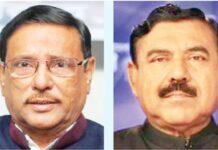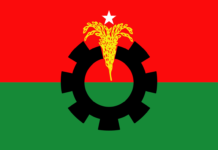Awami League had alleged that the past BNP-Jamaat government tried to divert the case investigation by implicating an innocent named Joj Miah
Over the last 25 years, four attempts have been made to assassinate Awami League President Sheikh Hasina. The attempts on her life included explosives being hurled at her house in 1989, explosives planted at her rally site in Gopalganj in 2000, shots fired at her in Shatkhira in 2002, while the deadliest attempt was the August 21 grenade attack which left 24 people dead in 2004.
Although a total of six cases had been filed in connection with the attacks, the case documents have been gathering dust over the years as legal proceedings continue at a sluggish pace.
Freedom Party bomb attack in 1989
On August 10, 1989, activists and leaders of Freedom Party allegedly launched an attack at Sheikh Hasina’s the then residence in Dhanmondi’s Road 32. The two cases filed in this connection are still in trial, currently pending at the court of the Fourth Additional Metropolitan Magistrate Md Ruhul Amin.
According to the case statement, Freedom Party members Kajol and Kobir with 10-12 men attacked Hasina’s residence by hurling bomb and firing gunshots. They chanted the slogan “Farukh-Rashid Jindabad” as they left the place.
Zahurul Islam, a security guard of the residence, filed the cases with Dhanmondi police station.
In 1997, eight years after the attack, Criminal Investigation Department’s (CID) former assistant superintendent Md Khaliquzzaman pressed charges against 19 people including Freedom Party leaders and Bangabandhu Sheikh Mujibur Rahman’s murderers Lt Col (retd) Syed Farukh, Lt Col (retd) Abdur Rashid and Maj (retd) Bazlul Huda in an attempted murder and another explosive case.
On July 5, 2009, charges were framed against 16 accused. Four of the accused – Sohel alias Freedom Sohel, Golam Sarwar Mamun, Joj Miah and Syed Nazmul Maksud Murad – are currently in jail. Four accused – Humayun Kabir, Mizanur Rahman, Khandokar Amirul Islam and Md Shahjahan alias Balu – had been freed on bail.
Syed Farukh and Bazlul Huda have been executed after receiving the death sentences in the Bangabandhu murder case; while two of the accused – Gazi Liakat Hossain and Rezaul Islam Khan – died of natural causes.
Kotalipara explosives in 2000
On June 20, 2000, the police recovered 76kg of explosives planted on the northern side of Sheikh Lutfur Rahman High School, where Hasina was scheduled to attend a rally a couple of days later.
The case filed in this connection was moved from the Gopalganj Special Tribunal 2 to the Speedy Trial Tribunal 2 in 2010, where it is yet to be resolved.
The Dhaka Tribune has learnt that only a single witness had given a deposition in the case over the last three years.
Asked why the witnesses were not coming to the court for depositions, Public Prosecutor Syed Shamsul Haque Badal said: “The court has issued arrest warrants against the witnesses. What can I do if they do not come even after the arrest warrant? Police is responsible in locating them.”
According to Badal, the court has so far recorded deposition from 43 of the 89 witnesses.
In the first charge sheet of the case, 16 people were named as accused; while 16 more names were later included after further investigation by the police. The main accused of the case is Mufti Abdul Hannan, chief of banned Islamist outfit Harkat-ul-Jihad al Islami (Huji).
Hannan’s brother Munshi Aminul Islam, also an accused, gave a confessional statement in the case. He said: “Mufti Hannan made the bomb to kill Sheikh Hasina. The bomb was made at a soap factory in Kotalipara. Hannan is the owner of the factory.”
Shots fired at Satkhira in 2002
On August 30, 2002, assailants fired bullets at Hasina near Satkhira’s Kalaroa upzila while the Awami League chief was on her way to the district from Jessore.
Former general secretary of Kalaroa Upazila Awami League Md Moslem Uddin filed a case with judicial magistrate court in this connection, naming the then BNP lawmaker Habibul Islam Habib as an accused.
The police submitted their final report in the case on December 25, 2003. Challenging the report, the plaintiff then filed a no confidence petition, which was dismissed by the court.
Later, the plaintiff filed a revision petition with the High Court. On July 28, 2013, the High Court passed an order directing the police to conduct a fresh investigation in the case. However, a fresh round of probe is yet to begin over the past year.
Grenade attack in 2004
On August 21, 2004, Huji militants allegedly carried out the grenade attack on a rally in front of the party headquarters at the Bangabandhu Avenue. Late president Zillur Rahman’s wife and 23 other activists and leaders of Awami League were killed and several hundred more sustained injuries
Although, Hasina narrowly escaped death, one of her ears was damaged and she also suffered various physical problems. Two cases were filed for murder and explosion in this connection.
Awami League had alleged that the past BNP-Jamaat government tried to divert the case investigation by implicating an innocent named Joj Miah.
On June 11, 2008, CID official Fazlul Kabir submitted a charge sheet against 22 people. After further investigation, CID official Abdul Kahar Akand submitted a supplementary charge sheet which included the name of BNP Chairperson Khaleda Zia’s son Tarique Rahman along with 29 others.
The involvement of Huji chief Mufti Abdul Hannan was also found by the CID. Hannan allegedly received support from some BNP leaders in carrying out the grenade attack.
The total number of accused in the case is 52, while 19 of them including Tarique are currently absconding.
So far, the court has recorded depositions by 97 witnesses out of 491.
For the delay in the cases, the prosecution blamed the defence lawyers. Witness deposition is currently going on in the case, which is taking place under the Speedy Trial Tribunal 1.
Source: Dhaka Tribune










